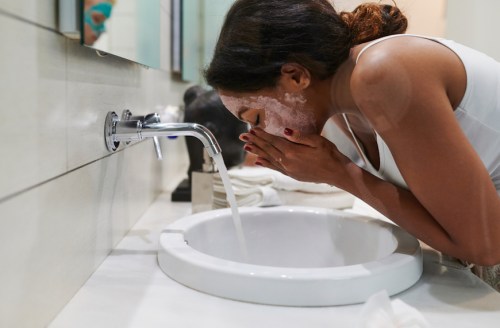There’s an urban legend swirling around the internet that eating and applying garlic to the skin can be life-changing for people with acne-prone complexions. People on Reddit in particular are eating raw garlic, taking garlic pills, and even applying the bulb directly to their faces and swearing by the results.
At first glance, this seems like it could be true. After all, there are other pantry-friendly ingredients like honey and sugar that are often used for DIY beauty treatments. But like a lot of other things read late at night on the internet, the assertion that garlic is good for acne is not the sort of thing that you should automatically take as truth.
To find out why you definitely should not overindulge the ingredient (at least not for the sake of your skin) or ever apply garlic to your face, keep reading for what two derms have to say about the beauty-blogger-perpetuated myth.
Be real with me: Does garlic help with acne?
To be fair to Redditors, garlic itself certainly has some properties that make it generally good for skin and overall health. It contains allyl sulfides, compounds that can help reduce inflammation. It’s also rich in allicin, an organic compound with antioxidant and anti-inflammatory benefits, along with lots of good-for-you vitamins and minerals. Given that acne is inherently an inflammatory condition, these benefits likely led people to assume that eating and applying excessive amounts of garlic could be a great solution for stubborn breakouts. Plus, garlic has been traditionally used in many cultures to heal wounds and other skin issues, so there is some precedent.
This Parisian Skincare Brand Is Launching in the United States for the First Time—Here’s What a Derm Wants You to Know

We’re Calling It: Cleansing Balms Are the Face Wash of the Future—Here Are 3 to Add to Your Cart

This Is the One Product That Scarlett Johansson Always Keeps in Her Purse and on Her Bedside Table

Alas, Morgan Rabach, MD, a board-certified dermatologist and co-founder of LM Medical NYC, says that a lot of this hype is overblown. Eating garlic won’t make existing breakouts going away, but she says it might help reduce the risk of future breakouts thanks to the aforementioned attributes, along with the fact that it contains vitamin C, copper, zinc, and selenium, all of which help to heal and prevent skin damage.
Want to learn more about garlic’s benefits? An RD shares everything you need to know:
However, just because garlic has some benefit does not mean that you should apply it directly onto your face. (Sorry, DIY beauty lovers!)
“Freshly chopped garlic should not be applied to the skin as it may cause a contact dermatitis reaction,” says NYC-based board-certified dermatologist Brendan Camp, MD. He says that there are many case reports of patients developing skin rashes as a result of topical garlic exposure. These reactions can range from mild, pink or red splotches to swelling, blisters, erosions, crusts, weeping, and unbearable pain or itchiness (no, thank you).
“These typically occur with higher amounts and concentrations of freshly chopped or crushed garlic,” Dr. Camp says, reminding us of why at-home acne treatments made with such ingredients should be avoided at all costs.
Additionally, garlic oil is a known rosacea trigger, so if you have rosacea along with acne, then you might further irritate your skin by eating or applying large quantities of garlic.
The bottom line: Garlic is an antioxidant-rich, anti-inflammatory ingredient that can boost immunity and improve just about any dish it’s added to. Unfortunately, the same can’t be said for acne-prone skin-care routines. As much as we all wish ridding our complexions of pesky pimples was as easy as heading to the kitchen and chopping up a few cloves, Dr. Camp says that there simply aren’t enough claims to prove it’d be safe, let alone worthwhile.
“There is some scientific data to suggest garlic may help improve wound healing, but there is little data currently available to suggest the consumption [or application] of garlic improves acne,” he concludes. Save the garlic for pasta night and look for other affordable, dermatologist-approved acne treatments instead.
These are the five most common types of acne, according to dermatologists. And if you have sensitive skin *and* acne (joy!), here’s how to deal.
Sign Up for Our Daily Newsletter
Get all the latest in wellness, trends, food, fitness, beauty, and more delivered right to your inbox.
Got it, you've been added to our email list.








